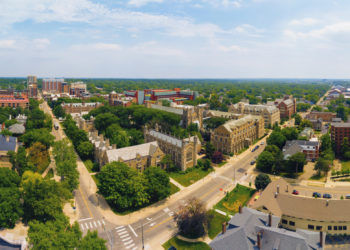This summer, the Society for Scholarly Publishing (SSP) introduced a new program, the Communities of Interest Network. With the aim of connecting scholarly communications professionals who share particular areas of expertise and focus, SSP Executive Director Melanie Dolechek explained in a recent post for The Scholarly Kitchen that, “Communities of interest will rely on virtual (or occasionally face-to-face) meetings and web-based collaborative environments to communicate, connect, and conduct community discussions and activities.”
One of the two pilot communities is for Humanities and Social Sciences (HSS) Publishing Professionals. Facilitated by Laura Ansley, Managing Editor at the American Historical Association, and Dawn Durante, Editor-in-Chief at the University of Texas Press, the HSS community will support the distinctive concerns and issues facing disciplines, fields, and publishing professionals often in the minority of scholarly publishing.
The HSS Community has already attracted a lot of enthusiasm and attention; clearly, there is a need for this group. As Charles Watkinson, Associate University Librarian and Director of the University of Michigan Press and the current President of the Association of University Presses noted when I asked him why he joined the network, “While AUPresses is an organization of organizations, SSP’s focus on individuals means it supports individuals as their careers evolve. This also helps make the SSP HSS Community Network excitingly diverse and it has already attracted librarians, independent scholars, vendors, and publishers — from commercial and nonprofit contexts, and working on journals and books. The daily work we all do is very similar, and we have so much to learn from each other. It’s exciting to see conversation topics already emerging on the HSS network (e.g., the opportunities and dangers of usage metrics) that bridge publishing fields. From the intersection of those fields, the best ideas often emerge. Person-to-person forums like the HSS network where we don’t have to preen and posture on behalf of our organizational overlords are great for thinking through shared challenges and opportunities. I’m excited to participate.”
The HSS community will have some initial virtual gatherings next week, but is encouraging more folks to join the group by expressing interest via this form. Membership in SSP is not required to participate. The group is planning to use the hashtag #HSSatSSP, so we can follow along on Twitter, too.
I wanted to know more about how Laura and Dawn saw the issues facing HSS publishing, and how they imagined the community coming together to help address them. I sent some questions, we gathered on a Zoom call, and then after reading the transcript Laura and Dawn, being editors, also responded in writing. I think of this as something akin to the way that HSS researchers and editors often work together – collaboratively, and in a process that isn’t linear but rather returns to a text to amplify, clarify, and refine key points.

Thanks so much for agreeing to talk with me about this new HSS community. Why do you think HSS publishing professionals need a community like this?
Laura Ansley (LA): I joined SSP about four years ago when I was working at an engineering association publisher, so I knew the benefits SSP brought, especially for STEM publishing. But when I moved to the AHA about three years ago, I found there isn’t an organization like the Council of Science Editors for HSS, and while we’re often having the same conversations, there are different nuances. So I posted on the C3 community asking if others wanted to connect, and Melanie Dolechek reached out about this pilot program. I asked Dawn to join as a co-facilitator, as she brings the university press experience to complement my association publishing experience. And we’ve been blown away by the positive response.
Generally, I’ve had trouble finding a place to talk about questions I have or issues I’ve faced — where I can say, “What do you usually do in this situation?” I would love our community members to find that kind of value in this group, to be able to crowdsource those questions. And the group will be shaped around what members want from it. What are the topics are they interested in talking about? Are there specific kinds of connections they wanna make? Maybe it’s a specific problem they’re facing. Maybe it’s someone looking to change jobs who wants to know more about what different positions entail. I hope all those things can happen in this message board space.
Dawn Durante (DD): I think there are a lot of people that haven’t found their network for these sorts of issues. For example, there are folks in AUPresses that have questions that SSP is more keyed into. It’s a really exciting time to have these special interest groups that create more equitable access to these sorts of discussions. An international group of people with a variety of interests and expertise have signed up, which means we can connect people who may not always have natural intersection points and foster easier access to information and discussion.
Tell me a little about the HSS folks who are already in or will be joining this community? Do you see HSS librarians and other scholarly communications professionals joining this community as well?
DD: We were overwhelmed by the response from the first pool of applicants! We thought 10 would be a success and now we have almost 60 people participating, so it definitely exceeded our expectations. And much of the way we are going to shape the initiative is based on who signed up. Our first order of business was to send a welcome message and ask, what are some things you’re interested in? And then we will start messaging boards around those topics. I’m particularly grateful that Laura advocated for this to be open to both SSP members and nonmembers, because I think the number of people from university presses who might not be members of SSP who joined shows that there is a healthy overlap within this topic.
LA: I hope the group shows both those individuals and their institutions that SSP is a place for them. I did think it was essential that the group be open to both SSP members and nonmembers. So even if they’re at a university press involved in AUPresses, maybe the journal staff should be members of SSP because these important conversations are happening over here. Or maybe people in libraries who haven’t really thought about SSP as a place for them, because it might be more STEM focused, find this a good group to join. A lot of people have been looking for professional development and professional support, and I hope the community might lead to more SSP members, more annual meeting sessions, and Scholarly Kitchen posts focused on HSS publishing.
How deeply do you see HSS publishing challenges connected to the challenges of research and funding, and of higher education?
LA: There are many issues in publishing that predate the pandemic, but the last two years have underscored for me how all of these systems are intertwined. We all know some of the challenges that have arisen, right? You’ve got the peer review problem, where the volunteer labor of something like peer review just cannot fit into the day when you’re also taking care of your kids when they’re outta school because of a COVID exposure. And you’re trying to write at night, while also answering all the emails from students who are facing their own challenges. I know for history researchers, who haven’t been able to travel and get to the archives for over two years, finishing projects and starting new ones has been difficult. And then there are problems that predate the pandemic, like the lack of tenure-track employment and the adjunctification problem, university budget cuts, and all the rest. These issues have only been exacerbated since 2020.
DD: Most of these issues have been simmering for some time, and like other things have been exacerbated by the pandemic. Within humanities and social sciences, we are talking about humans and yet there have been such significant humanity issues like pay equity that have led to the great resignation, which has led to labor shortage. And we’re seeing this across all aspects related to scholarly publishing, from the peer review labor shortage to skill and labor shortages at printers. So I think that right now there’s a messy confluence of all the things you mentioned, but we can trace the issues to well before the pandemic and the current political climate.
What are some of the unique challenges and concerns you’re hearing about that you think the community will take up?
DD: I think the community will take up the most pressing questions from the scholarly communities of researchers and authors that we serve. Questions don’t often arise without them beginning with our authors and the people we’re working to publish. For example, most conversations I’ve had about OA were driven, not because my press was all of a sudden, let’s find a new thing to figure out. We are tasked to find these things out when authors or communities ask, as part of our mission to serve our communities and disseminate information. I will be interested personally to see how the group frames these questions and the root of them in service and mission. And we have to think about the finances obviously. That’s where a lot of the questions have been so far – funding and transformative agreements, and the practical, which is what we all need to do day to day.
LA: For publishing, the pandemic has been transformative. We’re more aware than ever about our place in the global supply-chain — the paper shortage in particular has caused problems for everyone. Many of our vendors are also global. When COVID hit India hard, I was very concerned about our colleagues in Chennai, where our magazine is typeset. And in some ways, the pandemic has transformed the way the work gets done for all of us, with so many publishers allowing remote or hybrid work now.
Will education and outreach about those challenges and concerns be part of the community work?
LA: I consider myself to be on the cusp of early to mid-career, and so I’m entering this project with countless things I don’t know about. So I’m going to learn a lot from talking to people who work at university presses, or in book publishing, sales and marketing, or libraries. There will be a lot of space here just to learn from each other. I’m really excited about that, and I hope others find the group educational too. A conversation that starts on the message board could lead participants to decide it would be worth submitting an SSP annual meeting session or pitching a blog post to The Scholarly Kitchen. Maybe soon we’ll have some posts at the Kitchen about how open access is different in an HSS journal, or about the specific issues of OA monographs, or a discussion of fair use and copyright when you’re reproducing not data and figures, but archival sources or images of art.
DD: Education and outreach could blossom in this space. I would love for this to grow into sessions at SSP and or AUPresses that bring together some of these group members and topics. I’m hoping that this could even be a space for early career people to figure out what they’re interested in. This is an opportunity for people to learn what’s out there and learn about the field.


